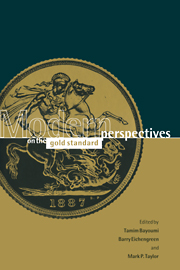Book contents
- Frontmatter
- Contents
- List of figures
- List of tables
- Notes on the contributors
- I Introduction
- 1 Modern perspectives on the gold standard: introduction
- 2 Unit roots, shocks and VARs and their place in history: an introductory guide
- II Operation of the gold standard
- III Adjustment mechanisms
- IV Monetary issues
- V Exchange rate behavior
- VI Conclusions
- Index
1 - Modern perspectives on the gold standard: introduction
Published online by Cambridge University Press: 05 November 2011
- Frontmatter
- Contents
- List of figures
- List of tables
- Notes on the contributors
- I Introduction
- 1 Modern perspectives on the gold standard: introduction
- 2 Unit roots, shocks and VARs and their place in history: an introductory guide
- II Operation of the gold standard
- III Adjustment mechanisms
- IV Monetary issues
- V Exchange rate behavior
- VI Conclusions
- Index
Summary
Economic liberalism is back in style. Around the world governments are opening their economies to trade, privatizing government enterprises, and deregulating markets. These changes have already had profound effects in many areas of the world. Some of the most dramatic changes that have occurred to date are in international capital markets, where transactions between countries in the developed world are now essentially free of government regulation. By contrast, as little as two decades ago the vast majority of industrial countries maintained a wide array of capital controls.
The liberalization of international capital markets has provided benefits to the world economy through improved financial intermediation. However, the new system has not been without costs. Increasing capital mobility is often seen as one of the underlying causes of the break-up of the Bretton Woods fixed exchange rate system in the early 1970s. More recently, abrupt changes in market sentiment have generated capital flows which have disrupted efforts to peg exchange rates between national currencies. Speculative crises forced the members of the Exchange Rate Mechanism (ERM) in Europe to abandon their 21/4 percent currency bands in 1993 in favor of more permissive 15 percent bands, and forced the United Kingdom and Italy to suspend membership in the Mechanism the previous year. Similar market pressures have also forced countries operating unilateral fixed exchange rate banks, such as Finland, Sweden, and Chile, to widen their exchange rate bands or abandon them entirely.
- Type
- Chapter
- Information
- Modern Perspectives on the Gold Standard , pp. 3 - 16Publisher: Cambridge University PressPrint publication year: 1997
- 2
- Cited by



